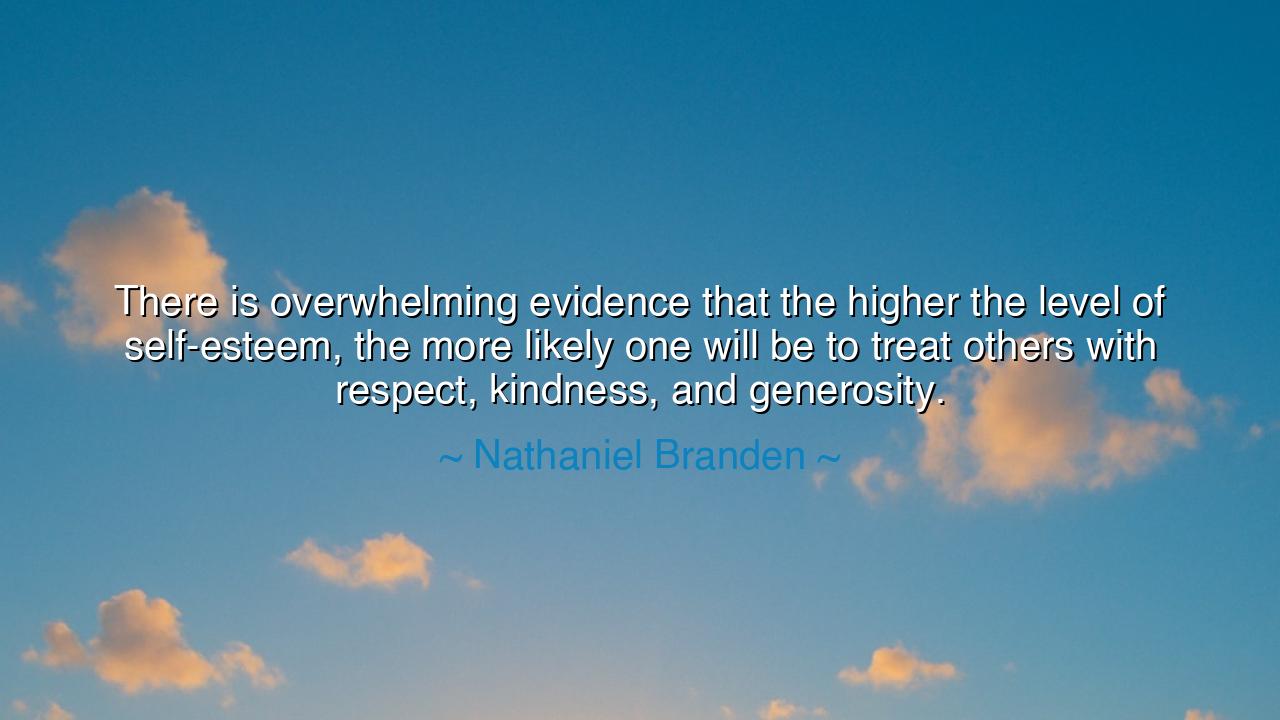
There is overwhelming evidence that the higher the level of
There is overwhelming evidence that the higher the level of self-esteem, the more likely one will be to treat others with respect, kindness, and generosity.






In the words of Nathaniel Branden, "There is overwhelming evidence that the higher the level of self-esteem, the more likely one will be to treat others with respect, kindness, and generosity." This profound statement speaks to the deep, inherent connection between how we perceive ourselves and how we treat others. Branden highlights a truth that has been observed throughout history and across cultures: our ability to respect and care for others is often a reflection of how we value and respect ourselves. When we cultivate self-esteem, we become more capable of extending kindness and generosity toward others, for we are no longer constrained by self-doubt or insecurity, but empowered by a strong, positive sense of self-worth.
The ancients understood the importance of self-respect as the foundation of a virtuous life. Aristotle, in his Nicomachean Ethics, believed that virtue is not only about acting morally but also about having the right self-regard. According to Aristotle, those who possess a healthy sense of self-respect are more likely to act in ways that promote the common good, as their actions are grounded in an understanding of their own value and the inherent value of others. In this way, Aristotle’s teachings echo Branden's modern insight—that self-esteem is closely tied to how we engage with the world around us.
Consider the example of Socrates, who, although constantly questioned and challenged, never wavered in his belief in his own integrity and worth. Socrates’s commitment to questioning the world and seeking truth was rooted in a profound sense of self-respect. He knew that without a solid sense of self-worth, his ability to challenge the status quo and treat others with fairness and respect would be compromised. His self-esteem allowed him to maintain his focus on justice and integrity, even when others ridiculed him or misunderstood his intentions. Socrates demonstrated that when we are grounded in a sense of self-worth, we are able to treat others with generosity and dignity, regardless of their position or station.
In the same vein, the Roman emperor and philosopher Marcus Aurelius teaches us that self-respect and respect for others go hand in hand. In his Meditations, Aurelius reflected on the importance of maintaining a balanced and virtuous life, in which one must neither be consumed by vanity nor be self-deprecating. Aurelius understood that to lead justly and to serve others effectively, one must have a healthy sense of self-worth, for only then can we fully understand the value of respect and kindness toward others. His example proves that self-esteem is not a mere feeling, but a principle that governs our interactions with others and determines our capacity to be generous and fair.
The ancient wisdom of Confucius also reflects the connection between self-respect and respect for others. Confucius taught that a person who strives for virtue and moral integrity first within themselves is the one who will be able to govern and influence society with justice and benevolence. He believed that the key to good leadership was found in an individual’s self-regard—the more we value ourselves, the more we can offer others in terms of kindness, respect, and generosity. In the same way, Branden’s assertion about self-esteem reminds us that to offer genuine respect to others, we must first cultivate it within ourselves, recognizing that our own worth is the foundation upon which we can build healthy, nurturing relationships with others.
In modern times, the work of Branden builds on these ancient teachings, showing that self-esteem is not just an abstract concept, but a powerful force that shapes our ability to engage with the world. When we feel good about ourselves, we are more likely to offer respect and kindness to others because we are no longer seeking external validation. Instead, we give to others from a place of abundance and genuine care, rather than from need or dependency. The higher our self-esteem, the more we are able to give, not because we are required to, but because we want to. Branden’s words reveal a profound truth about human nature—that respect for oneself enables us to be generous and compassionate toward others.
The lesson we draw from Branden’s insight and the wisdom of the ancients is simple yet profound: to foster a world of kindness, respect, and generosity, we must first cultivate these qualities within ourselves. Self-esteem is not about arrogance or pride, but about recognizing our own inherent worth and understanding that when we are strong in our own sense of value, we are more capable of extending that respect and kindness to others. As Socrates, Aristotle, and Marcus Aurelius teach us, the foundation of virtue and justice begins with a healthy sense of self-worth, and it is from this place of strength that we can engage with the world in a way that uplifts and empowers others.
In our own lives, we must strive to build and maintain a healthy sense of self-esteem by recognizing our worth and treating ourselves with kindness and respect. Let us focus on personal growth, integrity, and moral virtue, knowing that when we do so, we will naturally treat those around us with the same care. Whether in our workplaces, families, or communities, let us lead by example, showing that self-esteem is not just about inner validation but about how we reflect our self-respect outwardly in our relationships with others. By doing so, we create a cycle of kindness, respect, and generosity that strengthens the fabric of society.






AAdministratorAdministrator
Welcome, honored guests. Please leave a comment, we will respond soon